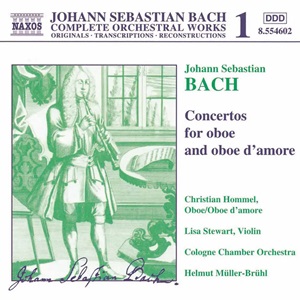
Johann Sebastian Bach (1685-1750)
Complete Orchestral Works Vol 1
Concerto in A major for oboe d’amore, BWV 1055
Concerto in G minor for oboe, BWV 1056
Concerto in D minor for oboe, BWV 1059
Concerto in F major for oboe, BWV 1053
Concerto in C minor for oboe and violin, BWV 1060
Christian Hommel (oboe, oboe d’amore)
Lisa Stewart (violin)
Cologne Chamber Orchestra/Helmut Müller-Brühl
rec. 1996, Studios of Deutschland Radio, Cologne
Naxos 8.554602 [68]
A real joy of Western Art Music is the discovery of quality music, hitherto not encountered. This may be obscure music, and music by a relatively unknown composer. It may also be music which has been reconstructed from fragmentary scores never completed by the composer. For example, ideas and sketches which Beethoven developed for a 10th Symphony before he died were finally pieced together into a single movement by Barry Cooper, circa. 1988. With the aid of AI, the original ideas of Beethoven were developed into a full 10th Symphony and performed in 2021.
J S Bach was not only an amazingly creative, and prolific composer, but a consummate master of re-arranging his music for different instruments, occasions and applications. No original scores exist for the music on this disc. Aspects of it will be very familiar, but here presented in a different guise. The programme relies on fragmentary sources and musical scholarship to reconstruct what has been lost long ago. Very little of Bach’s oeuvre for orchestra seems preserved for posterity, particularly from the Weimar and Cöthen period. One possible explanation is that Bach was obliged to leave the majority of his compositions when he moved to another post, a seemingly common practice of the time.
A good example of the scholarly reconstruction from fragmentary evidence is the Concerto BWV 1059. The original has survived in a fragmentary version for obbligato harpsichord and oboe, the realisation of which never progressed beyond the first bars of the opening movement. The other movements of the original work are included in the Cantata BWV 35, which leads to a reasonable conclusion that the work was originally an oboe concerto. The original middle movement form is challenging to ascertain because Bach re-worked it in the Cantata into an aria for alto, obbligato organ and strings, the formal scheme of which necessitated extensive changes. For this reason, the slow movement of the Concerto for Oboe by Alessandro Marcello is heard on this recording.
One fears no accusation of hyperbole when describing both the music, and rendition by soloists and orchestra on this recording, as stunning. Oboist Christian Hommel studied oboe with Heinz Holliger and piano with James Avery. He is a winner of numerous competitions and recipient of various awards for excellence. His playing on this recording is superior, demonstrating a comprehensive understating of the music and a highly developed musicianship. His versatility is further demonstrated by a strong personal interest in 20th century music.
Lisa Stewart is Australian by birth and began her study of the violin in the Suzuki Foundation, at the age of five. In 1980, she toured Australia, New Zealand, USA and Japan. She was a student of Christopher Kimber at the Sydney Conservatorium of music, and Igor Ozim at the Academy of Music in Cologne.
The Cologne Chamber Orchestra completes a fine coupling of soloist and orchestra. The rhythmic approach to this music initiates an irresistible ‘foot-tapping response.’ Additionally, Naxos has produced a recording of particularly fine sonic qualities. There is a strong sense of sonic realism and presence.
For aficionados of J.S. Bach who may not have heard some of their favourite music presented in these reconstructed concertos for oboe and oboe d’amore, a musical treat awaits.
Zane Turner
Buying this recording via a link below generates revenue for MWI and helps us keep free access to the site


















